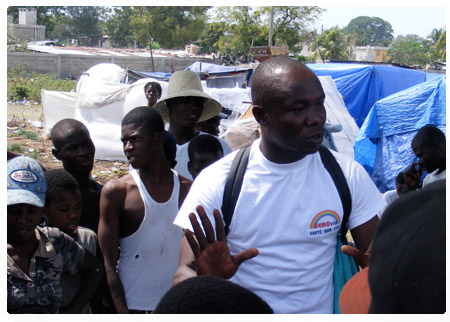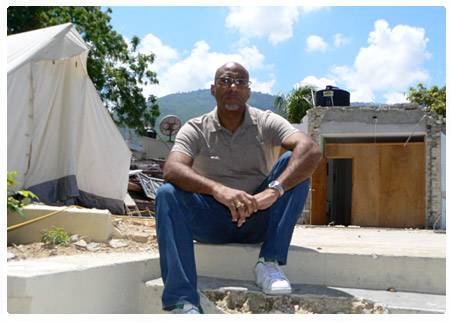Source: VillageTheatre1
Source: Bellevue Reporter
By Garrielle Nomura
Desperation, longing and full musical theater belting rocked the house, as actors performed "Take me America" at Village Theatre opening night, Sept. 14.
The name of the musical was also the the cry for help uttered by seven of the characters in the show, refugees who had come to the U.S. from all over the world, including Algeria, Darfur, China, El Salvador, Haiti and Palestine.
Those seven actors grappled with an added challenge of singing and acting with accents from their character's respective homelands. Whereas Aaron Finley, Dennis Batemen and (a hilarious performance by) Leslie Law, played the U.S. officials who determined whether they would stay or go.
Standout acting included Ben Gonio, who played a Chinese poet fleeing persecution under Communist China. Gonio's dramatic performance was gripping as he recounted atrocities he suffered in prison. On the other hand, performer Diana Huey, who played his wife, sparkled with an impressive vocal range and tenderness in her duets with Gonio.
In many cases, the characters in the musical were fleeing from certain death, such as Malith, a Dinka from Darfur, played by Ekello Harrid Jr.
More immediate than immigration, asylum requires people to prove they are fleeing from harm's way in their homeland.
In reality, this life-and-death situation happens everyday in the U.S.
"Take Me America" writer and lyricist Bill Nabel was inspired by the PBS documentary "Well Founded Fear," where filmmakers Michael Camerini and Shari Robertson enter the closed corridors of the Immigration and Naturalization Services. The film reveals a stark, haunting true story where human rights and American ideals collide with the nearly impossible task of trying to know the truth.
Some refugees seeking asylum lie about their reasons for wanting to come to the U.S.
That was touched on in Nabel's show with the character Jean, a Haitian refugee played by J. Reese. Jean lied about his reasons for seeking asylum, because no one will believe that he is actually a gay man.
This brings up another success of "Take Me America" – it's ability to entertain, while still presenting a serious topic. It's a musical that both excites, and wrenches the heart.
While Jean's story of being discriminated against for his sexual orientation was somber, the song "Not Gay Enough" was upbeat and humorous, depicting the various lengths Jean went to "look the part" for the U.S. bureaucrats, including dressing in drag and throwing glitter.
Finally, the show closed with projections of Lady Liberty over the simple, yet versatile set (a series of file cabinets) as refugees once again cried out the show's signature phrase.
Hearing these desperate cries, to be taken or rescued by America, was a reminder to audience members of their own freedoms in the U.S. As Nabel had hoped, the show redefined conventional notions of the American experience with both poignancy and a powerful delivery.
Take Me America runs now until Nov. 20 at Village Theatre, 303 Front St. N., Issaquah. For more information, go to www.villagetheatre.org or call the box office at 425-392-2202.
Showing posts with label Haiti. Show all posts
Showing posts with label Haiti. Show all posts
Sunday, 2 October 2011
Video: New musical looks at asylum seeker struggle in America
Saturday, 1 October 2011
In Haiti, the United Nations finally pledges protections for LGBT
 |
| Rafael Renold, SEROvie Peer Educator providing HIV Prevention Counseling and Training at the SARTHE Displaced Persons Camp |
The International Gay and Lesbian Human Rights Commission (IGLHRC) has won an important comittment for Haitian gay and HIV+ people, its Executive Director, Cary Alan Johnson, has said.
Johnson said that Nigel Fisher, humanitarian coordinator for the UN Stabilization Mission in Haiti has "pledged to help elevate the voices" of LGBT and HIV-Positive Haitians, "so their demands are met in the rebuilding process."
Fisher was speaking to hundreds of AIDS policy experts at the North American Housing and HIV/AIDS Research Summit, 22 September.
“People living with or affected by HIV and AIDS, or gay and transgender minorities, they are still left out in the cold,” said Fisher.Following the January 2010 earthquake rhetoric blamed LGBT people for bringing the “wrath of God upon Haiti.”
“So I can say to the summit organizers: You’ve already done two things in bringing me here. One, you’ve raised my awareness by inviting me. But, two, you’ve allowed me to meet with . . . Haitian advocates here. And we’ve already come up with some ideas about how we can work together once we return to Haiti.”
IGLHRC worked with SEROvie, Haiti’s men who have sex with men (MSM) Community Organisation, extensively in the months after the earthquake to document the secrecy, isolation, discrimination and violence that Haiti’s already vulnerable LGBT population was facing. With them they produced a report titled 'The Impact of the Earthquake, and Relief and Recovery programs on Haitian LGBT People', which proposed guidelines for the UN, governments, civil society organizations, and human rights groups to protect the human rights of LGBT people in disaster situations.
In March last year Johnson wrote of a visit to Haiti:
"Many in this community have been left without food, shelter or identification—and more still have lost close family members and friends. SEROvie has distributed food and medication to LGBT people in Port-au-Prince, Haiti’s devastated capital, and have begun to re-launch their important work in 5 regions (Le Nord, L’Ouest, Le Sud-Est, Artibonite, le Sud) around the country. They are also trying to help LGBT people in the makeshift camps for the displaced in Port-au-Prince, distributing condoms and lubricant (some of which was provided by Gay Men’s Health Crisis (GMHC) ) and by offering encouragement and understanding to a marginalized group of people that, in the span of 37 seconds, was rendered substantially more vulnerable."In March this year, the Inter-American Commission on Human Rights (IACHR) held a thematic hearing on “Human Rights, Sexual Orientation and Gender Identity in Haiti.” [See video of the hearing] Petitioners in the hearing included the IGLHRC and SEROvie.
Said Johnson of Fisher's pledge:
"We are happy to see this important pledge of support from the UN. As a supporter of our organization, I wanted to share with you this example of the real impact of our work and of your support."
Related articles
- Video: In Haiti, LGBT ignored post-earthquake (madikazemi.blogspot.com)
- LGBT in Haiti, Three Months After the Quake (madikazemi.blogspot.com)
Thursday, 26 May 2011
Video: In Haiti, LGBT ignored post-earthquake
Source: The Human Rights Brief
By Mina Trudeau
- Commissioners: Dinah Shelton, Luz Patricia Mejía Guerrero, Rodrigo Escobar Gil.
- Petitioner: International Gay & Lesbian Human Rights Commission
- State: State of Haiti
During its 141th period of sessions, on March 25, 2011, the Inter-American Commission on Human Rights (IACHR) held a thematic hearing on “Human Rights, Sexual Orientation and Gender Identity in Haiti.” Petitioners in the hearing included the International Gay and Lesbian Human Rights Commission and SEROvie, a Haitian community organization addressing the concerns of sexual minorities, HIV-positive people, and their families, and the Respondent state of Haiti. IACHR President Dinah Shelton presided over the hearing, with Commissioner Luz Patricia Mejía Guerrero and Commissioner Rodrigo Escobar Gil.
Petitioners raise concerns regarding specific post-earthquake impacts on LGBT Haitians.
Labels:
Haiti,
IGLHRC,
video/audio
♦ Add to del.icio.us ♦ DiggIt! ♦ Add to Reddit ♦ Stumble This ♦ Add to Google Bookmarks ♦ Add to Yahoo MyWeb ♦ Add to Technorati Faves ♦ Slashdot it ♦
Friday, 1 April 2011
In Haiti, LGBT ignored post-earthquake
 Image via Wikipedia
Image via WikipediaViolence and discrimination against lesbians, gays, bisexual and transgender (LGBT) people has increased since the January 2010 earthquake, the International Gay and Lesbian Human Rights Commission (IGLHRC) and SEROvie said in a briefing paper issued today. The paper, The Impact of the Earthquake, and Relief and Recovery Programs on Haitian LGBT People (PDF), documents anti-LGBT human rights violations that have occurred since the earthquake.
“UN Agencies, private organizations, and governments must recognize the horrible impact of the Haiti disaster on LGBT people,” said Cary Alan Johnson, IGLHRC’s Executive Director. “While the needs of some marginalized groups are at least acknowledged, LGBT people are completely ignored.”
Perhaps most shocking, conservative religious leaders in Haiti even blame LGBT for the earthquake, leading to increased stigma and violence.
“In the days and weeks after the earthquake, we were shouted at in the streets…you gay people, take your sin and go, you are responsible for this tragedy’” said Reginal Dupont, Program Manager at SEROvie. “Many masisi were attacked, verbally and physically.”
Labels:
Haiti
♦ Add to del.icio.us ♦ DiggIt! ♦ Add to Reddit ♦ Stumble This ♦ Add to Google Bookmarks ♦ Add to Yahoo MyWeb ♦ Add to Technorati Faves ♦ Slashdot it ♦
Monday, 26 April 2010
LGBT in Haiti, Three Months After the Quake
By Cary Alan Johnson, IGLHRC Executive Director
In the fall of 2009, I traveled to Haiti to get a better understanding of emerging LGBT communities, the impact of HIV on men who have sex with men (MSM), and how LGBT were responding to the HIV crisis. At the time, I met some talented, committed individuals, who were mainly working in the context of the HIV prevention, treatment and care sector, but were also steadily carving out a space for the promotion and protection of a broad set of human rights for LGBT people.
It has only been three months since the devastating 7.0 magnitude earthquake of January 12, 2010, and I have returned to Haiti, along with Marcelo Ferreyra, IGLHRC’s Latin America and Caribbean coordinator, and researcher Samara Fox. This week we will be interviewing LGBT Haitians, relief workers, and human rights activists to learn more about how the earthquake and the recovery efforts are impacting LGBT lives.
Our findings will help us understand the specific difficulties that LGBT people face in the wake of massive disasters and upheaval so we can make our partnerships as useful as possible when working with organizations such as SEROvie and its members in Haiti, and LGBT communities elsewhere in the wake of catastrophes.

Cary Alan Johnson, IGLHRC at the SEROvie offices
Stepping into the courtyard of the offices of SEROvie, the only organization in Haiti working exclusively with gay and bisexual men and transgender women, is a shocking experience. The bright, spacious office that I had visited only 7 months ago has been reduced to its foundations. The one room left standing is the office of Program Director Reginald DuPont, a composed young man with a reassuring voice, who oversees SEROvie’s counseling and outreach programs. Fourteen SEROvie members were killed on the day of the earthquake; seven in the collapse of the office. Reginald pulled many of the dead and dying from the rubble himself.
Subscribe to:
Posts (Atom)









 Join our page
Join our page

